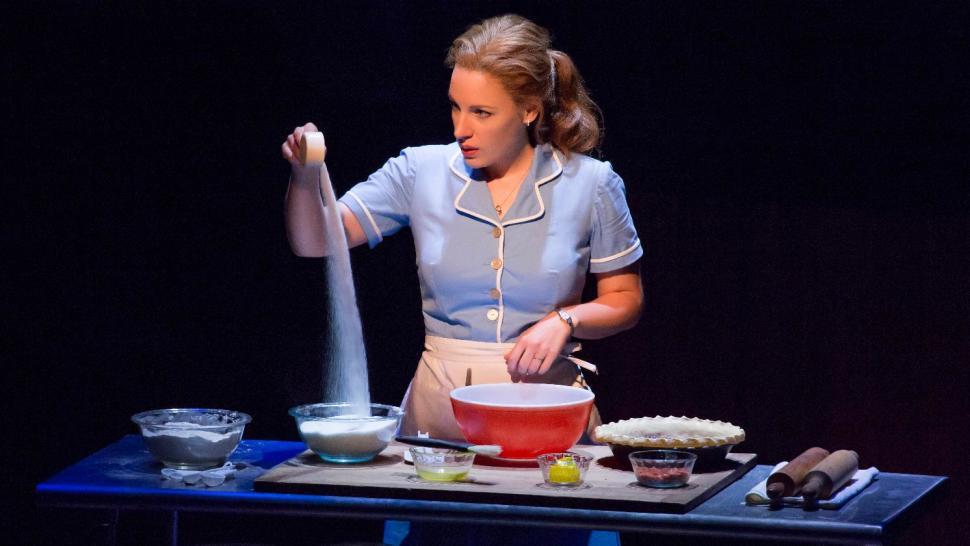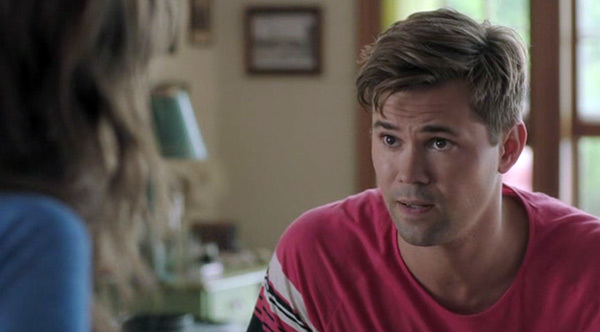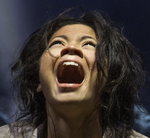SPOILER Waitress SPOILER
Seperite
Understudy Joined: 12/22/14
#1SPOILER Waitress SPOILER
Posted: 4/11/16 at 12:30pm
SPOILER SPOILER SPOILER
I didn't want to put this in the "previews" section because it's a question that is entirely based on a 'spoiler' aspect of the show, and not a general review of the entire show. Don't read if you haven't seen it and like to be surprised. <br> <br>
I was quite surprised to see Earl display some tenderness and neediness towards the end, and equally surprised to see Jenna be as dismissive of them, and non-empathic towards him, as she was. I wonder what message the creative team was trying to impart. Is it that abusers are just plain manipulative, and will shift from being monsters to sweet on a dime, just as a disingenuous means of exerting their control? If so, then Jenna's finally rejecting this ploy, and ultimate deciding to leave Earl, makes for a nice, cathartic denouement. <br> <br>
But an alternative explanation is that the creative team was trying to show a more three-dimensional side of Earl. Perhaps, for all his faults, he's just emotionally stunted, and doesn't know how to properly express love or connect in an adult way. Maybe he really loves her, and her reason for leaving him is simply that she's not content in the relationship. If that's the case, then her decision to have an affair and ban Earl from having a relationship with his child is a selfish act that becomes downright mendacious and vicious. <br> <br>
Although we definitely see a couple of glimpses of Jenna being visibly frightened of Earl throughout the piece, I'm not certain that he is intended to be depicted as a villain. Jenna's expressions of discontent throughout the piece amount to complaints about being unhappy and dissatisfied, not of her being the victim of abuse. Sticking a trucker hat, a southern accent, a propensity to yell, a generally dimwitted demeanor, and a beer bottle on a character may play into stereotypes and make him the kind of character you don't root for, but it doesn't necessarily make him abusive or evil. He doesn't hit her. He doesn't call her names. He doesn't demean her. He doesn't insult her. He doesn't control her (aside from insisting on being in charge of the family finances.) He doesn't restrict her from going where she wants, or doing what she wants. He doesn't tell her what friends to have or not have. He's not your prototypical abuser. He's just...a boor, who is ill-suited to be matched with this precocious, ambitious, intelligent, and sweet protagonist. But equating a boor with a miscreant is an association we make with our own minds; it's not in the text of the piece. Viewed in that light -- that Earl is wrong for Jenna, that he's beneath her, that he's a poor match for her -- makes Jenna a far less sympathetic character than the way she is presented by the director. <br> <br>
I wonder if the book-writer intended for Jenna to be a far more morally ambiguous character than the way she's depicted in this production.
#2SPOILER Waitress SPOILER
Posted: 4/11/16 at 12:36pm
If you click the little "plus" sign in the above formatting section, you can create a whole hidden spoiler chunk within a post.
#3SPOILER Waitress SPOILER
Posted: 4/11/16 at 1:04pm
I believe Earl is 100% abusive. He's controlling of her finances and time - wants to know where she is always, verbally abusive - tells her she is nothing without him, physically abusive - we see him grab her and about to hit her before she says she is pregnant, and there's also a point when he directs her toward the bedroom when she's clearly not happy or interested in being with him.
I don't think Jenna is really morally ambiguous.I'm going to copy a post a wrote in the previews thread in response to a comment about he scene when Earl cries and Jenna finally dumps him:
I actually think this scene was pretty effective at showing how Jenna had finally "had it" with Earl's behavior, truly seeing through his BS. She is starting to recognize her own self worth for the first time in a long time. While we only see one instance of it, I believe his tearful apology is supposed to be just one of many in a pattern. It's very common for an abuser to apologize, resulting in the victim staying and perpetuating the cycle. Remembering that Jenna has been with Earl since high school, and grew up in a house where her father abused her mother, it clearly takes the character a long time to see the light. Dr Pomatter is gentle and kind which I think triggers something in her to realize she is worth more (as well as the influence of her friends and baby on the way).
The scene when he cries and asks her to say she won't will love the baby more than him made my stomach turn - and I'm glad for that. It was the right way to portray a controlling, abusive husband.
CaseyAlterMink
Swing Joined: 9/5/13
Alex10
Stand-by Joined: 11/18/15
#5SPOILER Waitress SPOILER
Posted: 4/11/16 at 2:09pm
I think Earl is 100% written to be abusive. He's overly controlling, insults her, threatens her, and while I haven't seen the Broadway production yet, I did see it in Boston and clearly remember references to him having hit her before she got pregnant. But it is common behavior for abusers to feel remorse for what they've done (or pretend to in order to appear sympathetic) and beg for second chances because they honestly do love their victims. But that doesn't make them not abusive, and it doesn't make Jenna wrong in any way for getting out of a relationship that was hurting her and protecting her child from being abused the same way. I think, after the story we've seen, that this was a very happy and emotionally satisfying ending.
#6SPOILER Waitress SPOILER
Posted: 4/11/16 at 2:11pm
With all due respect, how in the world could you not classify Earl as controlling? She wants to do something so harmless as enter a baking competition and that, to Earl, is a ludicrous idea as it supplies Jenna with any sort of identity differing from "Earl's wife."
Furthermore, he is absolutely abusive towards her. We don't ever see him "hit" her, but he certainly uses physical intimidation (ie: smashing the guitar). Also, in the film, he does hit her at one point-- I guess the decision to leave that out of the show was made by the creatives. But yes, Earl and Jenna are fully in an abusive relationship, and I do believe his begging her to be his and showing that "vulnerability" is meant to depict textbook abuser behavior.
#7SPOILER Waitress SPOILER
Posted: 4/11/16 at 2:16pm
Yes. Thank you TFMH and Alex10
Jessie Mueller clearly thinks the character she is playing is a victim of abuse. The following link to a survivor resource is the last line in her Playbill bio: www.mssm.edu/savi
Seperite
Understudy Joined: 12/22/14
#8SPOILER Waitress SPOILER
Posted: 4/11/16 at 3:00pm
I am trying to distinguish between that which is in the script in the one hand, and choices made by the actors and director.
I think it is fairly clear that Jesse Mueller (perhaps at the behest of the director) has made a choice, as an actor, to play the character of Jenna in a way that depicts her as being fearful of Earl. Thus, in turn, suggests that he is, in fact, abusive.
By grabbing her hands and looking as though he is going to hit her just before she announces she is pregnant, Eric Cordero has made a similar actor's choice.
But does the text itself necessitate such an interpretation? Im not sure. While Mueller and Cordero's choices are obviously fair and legitimate ways to understand the characters, it appears that the bookwriter deliberately elected to make things more ambiguous. Among all of the many instances in which Jenna expresses how discontentment with her relationship, bothin conversations with her friends and songs that break the fourth wall, I don't think there's a single expression of fear of Earl, or complaint that he is abusive. Instead, the mantra that is repeated throughout is how unhappy and unfulfilled she feels. There is obviously a huge difference between feeling unhappy because you're in a relationship with the wrong person, and actually being trapped in an abusive relationship. The text (as distinguished from the performances) does not necessarily suggest that the latter represents Jenna's predicament.
By showing Jenna as physically cowed, and thus intimating that she is, in fact, being abused, I believe the director and actors have made the LESS interesting choice. It is easy to root for a character who escapes abuse. It is much more difficult (and thus, more interesting) to be presented with a character who chooses to seek her own happiness at the expense of others who don't deserve to be so maligned. I thought the show was going to go down that road when Earl started to cry, and was disappointed that it didn't. The directorial choices make the decisions as to who we are supposed to empathize with, and that makes for a less engaging, less thoughtful theatrical experience.
In a sense, it also does a disservice to the notion of female empowerment. The implied message in this show is that a female protagonist is empowered to pursue her own happiness (a theme explicitly expressed w references to the declaration of independence) and that is a good thing. But why does she have to be a victim of abuse first? Is that the only way that picking oneself up by the bootstraps and changing one's life is justified -- only if one's predicament is dire? Think about just about any musical where the protagonist is a man. He sings an "I Want" song, pursues his "corner of the sky," and by the end, we all celebrate his achieving his happiness and finding himself in a completely different place than he was at at the top of the show. The motivation for the pursuit is rarely abuse; it is simply the character's discontentment with wherever he finds himself, which justifies his pursuit of the "American Dream" that we all cheer for. But if this production of Waiteress is any indication, a woman is only justified in doing the same thing if she is the victim of abuse.
A much more interesting interpretation of the show would hew closer to the script. It would have Jenna be deeply unhappy at being married to a man who is beneath her and wrong for her in so many ways, but who is decidedly NOT abusive. Jenna then pursues her relationship with the doctor, and eventually pushes Earl out of her life, not because he is a bad guy, but because he is simply the wrong guy...and a contemporary woman is empowered to make that choice and change her life.
That story, I submit, is in the script. But it is not onstage at the Broadhurst.
Seperite
Understudy Joined: 12/22/14
#9SPOILER Waitress SPOILER
Posted: 4/11/16 at 3:06pm
I should temper my comments by noting that I have not read the script -- I only saw it, once, this past weekend. It is certainly possible that I missed certain lines that would undermine or altogether undermine my interpretation. (Despite sitting in the front orchestra, and having no hearing challenges that I am aware of, I found a LOT of the lyrics of the songs difficult to make out. The sound design does not appear to be very good in this show.) For example, someone in this thread mentioned that Earl proclaims that Jenna is "nothing" without him, which would certainly qualify as a terrorizing, abusive, controlling thing to say. But I don't recall any such line, or anything remotely similar to such a line, in the preview I saw. If I am misremembering, please advise.
#10SPOILER Waitress SPOILER
Posted: 4/11/16 at 3:07pm
Yes. He is abusive. In the SCRIPT. Why would you want to humanize him?
#11SPOILER Waitress SPOILER
Posted: 4/11/16 at 3:12pm
He's definitely controlling in the script. Controlling is a very serious type of abuse.
I'm not sure why you think it's more interesting to leave someone because you don't think they're right for you. That happens to millions of people every day. I find it much more interesting to see an abused woman break free from the manipulative pattern abusers use of alternating terror with smothering "love". It's much less common for people to escape that dynamic.
#12SPOILER Waitress SPOILER
Posted: 4/11/16 at 3:18pm
^ This.
#13SPOILER Waitress SPOILER
Posted: 4/11/16 at 4:02pm
I am sorry but there are several instances where physical harm is threatened and that alone qualifies as abuse.
Take, for example, when Earl arrives at Dawn's wedding. Becky urges her not to leave with him but Jenna assures her "that will just make it worse." So, against her will, Jenna follows her husband out of the wedding, so as not to further anger him and reap the consequences.
If you do not identify Earl's behavior as abusive, I frankly worry for your loved ones!
Seperite
Understudy Joined: 12/22/14
#14SPOILER Waitress SPOILER
Posted: 4/11/16 at 4:09pm
Because for the viewer, it is much more interesting to see depictions of moral ambiguity than it is to watch black and white portrayals of good and evil. If Earl is abusive, then Jenna is justified in taking any action to protect herself and her child. The audience doesn't have to think about it. But if Earl is merely the wrong guy for her, or even if he's generally a jerk, then the choices Jenna makes -- having a long, emotionally invested affair, and barring Earl from ever seeing his child -- become much more questionable.
But even then, they're not necessarily "wrong!" The oft-quoted (in the show) line from the Declaration about the right to the pursuit of happiness applies to all, not solely to victims of abuse. Should a person sacrifice her own right to happiness, or should she pursue it with reckless abandon, even if others who don't deserve to be hurt (the doctor, his wife, and maybe, possibly, depending on your interpretation, Earl) do indeed get trampled in the process? To me, that's a much more interesting, empowering, controversial, and contemporary story than escaping from sheer evil is. The latter is a story we've seen a thousand times. The former is not, particularly with a female protagonist.
Seperite
Understudy Joined: 12/22/14
#15SPOILER Waitress SPOILER
Posted: 4/11/16 at 4:13pm
TFMH --
You raise a good point. Like I said, I've not read the text; I only saw it performed, once, with a sound system that made it difficult to make out every word. It is entirely possible that I missed clear indications of abuse in the text (and yes, of course I acknowledge that being controlling is being abusive!) If such examples are indeed present, then that obviously contradicts my whole point. I just don't remember them being there, and thought, while I watched, that this was a deliberate attempt by the bookwriter and lyricist to leave interpretation of what Earl has or has not done to the actors, directors, and audience
#16SPOILER Waitress SPOILER
Posted: 4/11/16 at 4:34pm
Seperite said: "Because for the viewer, it is much more interesting to see depictions of moral ambiguity than it is to watch black and white portrayals of good and evil."
There's quite a bit of questionable morality at work in the Becky/Earl affair. Same goes for Dr Pomatter - though he feels guilt. While I'm not condoning cheating, it's ironic that Jenna is the character who struggles most with what she is doing, when she has the best reason, for lack of a better term, for doing it.
If Earl is abusive, then Jenna is justified in taking any action to protect herself and her child.
No need for the "if" here. We've clearly established that the character is abusive. I know you said you haven't read the script and may have missed some lines, so allow us to put that question to rest. He is an abuser.
Should a person sacrifice her own right to happiness, or should she pursue it with reckless abandon, even if others who don't deserve to be hurt (the doctor, his wife, and maybe, possibly, depending on your interpretation, Earl) do indeed get trampled in the process? To me, that's a much more interesting, empowering, controversial, and contemporary story than escaping from sheer evil is. The latter is a story we've seen a thousand times. The former is not, particularly with a female protagonist."
Maybe the direction of the Waitress storyline - movie and musical - just isn't interesting to you. I'm not trying to sound snarky but I think you are looking for a story that goes in a different direction that neither of these works does. I actually very much appreciate the criticism you are offering though because it's caused me to look deeper into the story.
#17SPOILER Waitress SPOILER
Posted: 4/11/16 at 4:49pm
^Agreeing with the above, it sounds like the original poster is yearning for a story more along the lines of Bridges of Madison County, when the question of whether the protagonist has good reason to leave her life behind is is primary. This, however, is not at all the same kind of story, so perhaps you should just chalk your disinterest up to that.
Seperite
Understudy Joined: 12/22/14
#18SPOILER Waitress SPOILER
Posted: 4/11/16 at 5:09pm
Oh no no no...do not misunderstand. I absolutely *adored* this show. I literally cried a tear of joy at the end. I thought the performances, song, and story were all absolutely lovely.
I do have my criticisms; I thought the roles of Earl and the 'Betsy Ross' waitress friend were horribly miscast. (Whereas Jessie Mueller was organic, true, and completely invested in her character, the guy playing Earl was playing a caricature of a boor. It was entirely inauthentic and clashed terribly with Mueller's first-rate performance. The 'Betsy Ross' waitress was also far too bubbly, effervescent, and frankly, good-looking to be believable as the "nerdy" friend who never gets any attention. This role, too, was played exclusively for laughs, without an ounce of truth or realism.) And, of course, I have my issue with the directorial/acting choices to make Earl an abuser. But overall, I thought it was magnificent.
Until I see a concrete example from the text to the contrary, I stand by my original contention that the question of whether Earl is an abuser is, I think, a matter of interpretation. There were plenty of opportunities over the two and a half hours of text and lyrics to give an explicit indication that Earl was abusive; the fact that no such indication appears in the text (to my recollection) is indicative of a conscious choice by the lyricist and book writer.
I think you're missing something if you think the story is exclusively about a victim of abuse gathering the strength and courage to break free of her tormentor. Remember that scene in which the other waitress (I can't remember her name) is caught making out with the cook (can't remember his name, either.) That prompts a speech in which each justifies their decision to have an affair. Three characters in the piece -- the doctor, the waitress-friend, and the cook -- all decide to have an affair behind the back of a spouse who most certainly does not 'deserve' to be cheated on. And yet, none of them face any kind of blowback or criticism in the script. The very contemporary, very controversial message I took from that is that the lyricist/book-writer is commenting on the state of relationships today -- that conventional notions of strict monogamy do not result in absolute happiness and contentedness. That people can and do pursue 'side' relationships, not necessarily because they or their primary partners are 'bad', but because the human beings are entitled to 'pursue happiness' that decades of monogamy simply cannot provide.
That interpretation fits in perfectly with an interpretation that Earl is not necessarily abusive, but that Jenna is nonetheless justified in making the choices she makes simply because she is not happy. And everybody, even a waitress in a lowly diner in a nondescript town, is entitled to happiness.
#19SPOILER Waitress SPOILER
Posted: 4/11/16 at 5:45pm
So you didn't really want to have a conversation or for us to give you the info you claimed to have been looking for .So, why post your question at all?
You do realize that people have affairs all the time and for varied reasons and that most don't get caught. And even if they do get caught, that any consequences are often private. We don't do public flogging or put people in the stockade anymore. Of course the divorce rate is pretty high.
I also think the other waitress has an interesting reason for her infidelity, one that I suggest many friends and family would be understanding of.
This isn't a story of the ills of extra-marital affairs. It's about one specific woman's journey for inner strength.
#20SPOILER Waitress SPOILER
Posted: 4/11/16 at 6:55pm
"And, of course, I have my issue with the directorial/acting choices to make Earl an abuser. "
Seriously, this is not a directorial/acting choice. No one here can have the script to quote passages to you to prove this. But this is NOT the story you want it to be. It is based on a movie which is specifically about her struggle to escape from an abusive husband who is specifically physically threatening, and start her life over. Watch the movie. It's clear as a bell.
From the wikipedea page of the movie...
" trapped in an unhappy marriage with controlling bully Earl"
"...That comment wipes away any concerns she has about her lack of money and her fear of her husband. With determined frankness she tells him bluntly she hasn't loved him in years, will no longer put up with his possessiveness and abuse, and wants a divorce. (It's implied perhaps that she was worried that he would continue his abusive nature with her daughter hence why she finally decided to leave him.)
This is the story the play is based on. It is not some other story.
#21SPOILER Waitress SPOILER
Posted: 4/11/16 at 8:04pm
dramamama611 said: "So you didn't really want to have a conversation or for us to give you the info you claimed to have been looking for .So, why post your question at all?
You do realize that people have affairs all the time and for varied reasons and that most don't get caught. And even if they do get caught, that any consequences are often private. We don't do public flogging or put people in the stockade anymore. Of course the divorce rate is pretty high.
I also think the other waitress has an interesting reason for her infidelity, one that I suggest many friends and family would be understanding of.
This isn't a story of the ills of extra-marital affairs. It's about one specific woman's journey for inner strength.
"
Everyone is entitled to their own opinion and interpretation of the story. I find the one right answer that you need to score high on the SAT very inhibitive and off-putting in a discussion of an art piece
#22SPOILER Waitress SPOILER
Posted: 4/11/16 at 10:04pm
I only saw it in Boston, but one of the biggest problems I had with the show was that when Jenna finally tells Earl she's leaving him, he's gone. Anyone who has dealt with a narcissistic control freak like that knows that he would NEVER allow that. He would terrorize her in an effort to get her to stay, even if he doesn't love her, because it's all about him. When that happened in the show, that was the final piece to my thinking that the male characters were thinly drawn. I hope that has improved in the Broadway production.







